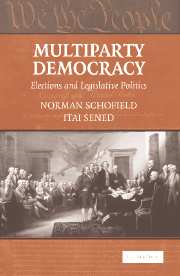Book contents
- Frontmatter
- Contents
- List of Tables and Figures
- Preface
- 1 Multiparty Democracy
- 2 Elections and Democracy
- 3 A Theory of Political Competition
- 4 Elections in Israel, 1988–1996
- 5 Elections in Italy, 1992–1996
- 6 Elections in the Netherlands, 1979–1981
- 7 Elections in Britain, 1979–2005
- 8 Political Realignments in the United States
- 9 Concluding Remarks
- References
- Index
- POLITICAL ECONOMY OF INSTITUTIONS AND DECISIONS
9 - Concluding Remarks
Published online by Cambridge University Press: 06 July 2010
- Frontmatter
- Contents
- List of Tables and Figures
- Preface
- 1 Multiparty Democracy
- 2 Elections and Democracy
- 3 A Theory of Political Competition
- 4 Elections in Israel, 1988–1996
- 5 Elections in Italy, 1992–1996
- 6 Elections in the Netherlands, 1979–1981
- 7 Elections in Britain, 1979–2005
- 8 Political Realignments in the United States
- 9 Concluding Remarks
- References
- Index
- POLITICAL ECONOMY OF INSTITUTIONS AND DECISIONS
Summary
ASSESSMENT OF THE MODEL
We briefly conclude with an assessment of the model presented in this book, together with some remarks on how the work can be extended.
The essence of democracy is that voters respond to the past acts and promises of party leaders. It has been traditional to use manifestos as measures of promises, and to gauge the distance between the preferred policy of the voter and the promise of the party leader as the “disutility” of the voter. In addition, of course, the voter may not trust the party leader. Valence is one very simple way to model the judgment of the voter about the degree to which the party leader can be trusted. This addition to the standard spatial model of voting changes one of the principal results of the model, namely the mean voter theorem. As the main theorem of Chapter 3 shows, it is no longer necessarily the case that all parties will converge to an electoral center. Instead, each election will be characterized by a convergence coefficient. Empirical analysis associated with the election can be used to give a list of valence coefficients for each of the party leaders. If the valences are similar, then the convergence coefficient will be low, and symmetry will induce all parties to converge to the center.
The formal model shows that this convergence coefficient is an increasing function of the valence differences, the electoral variance, and the spatial parameter. Moreover, with many parties with differing valences, the coefficient will tend to be high.
- Type
- Chapter
- Information
- Multiparty DemocracyElections and Legislative Politics, pp. 199 - 208Publisher: Cambridge University PressPrint publication year: 2006

